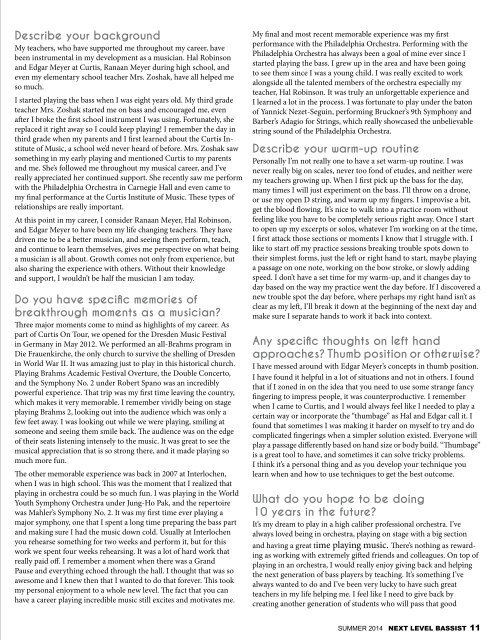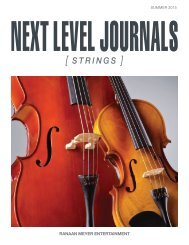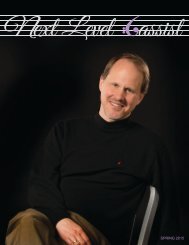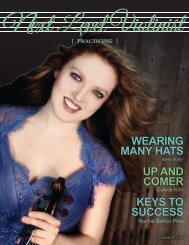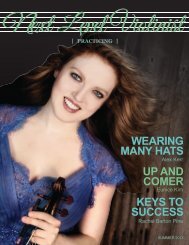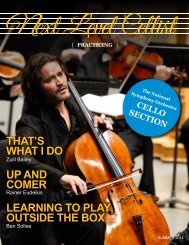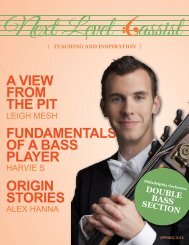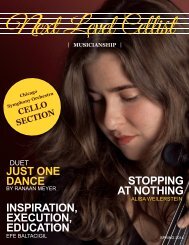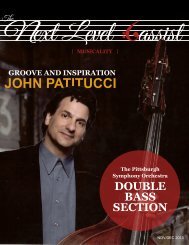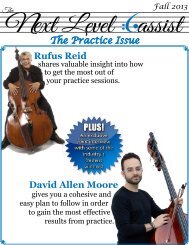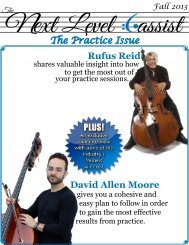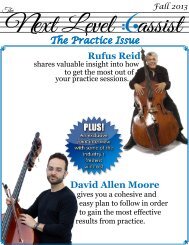Next Level Bassist Left Hand
Summer 2014 edition of Next Level Bassist. Left hand techniques and exercises by Nicholas Walker, Jordan Anderson, Paul Kowert. Section Spotlight on Cleveland Orchestra. Up and Comers Tim Dilenschneider and Jordan Morton
Summer 2014 edition of Next Level Bassist. Left hand techniques and exercises by Nicholas Walker, Jordan Anderson, Paul Kowert. Section Spotlight on Cleveland Orchestra. Up and Comers Tim Dilenschneider and Jordan Morton
You also want an ePaper? Increase the reach of your titles
YUMPU automatically turns print PDFs into web optimized ePapers that Google loves.
Describe your background<br />
My teachers, who have supported me throughout my career, have<br />
been instrumental in my development as a musician. Hal Robinson<br />
and Edgar Meyer at Curtis, Ranaan Meyer during high school, and<br />
even my elementary school teacher Mrs. Zoshak, have all helped me<br />
so much.<br />
I started playing the bass when I was eight years old. My third grade<br />
teacher Mrs. Zoshak started me on bass and encouraged me, even<br />
after I broke the first school instrument I was using. Fortunately, she<br />
replaced it right away so I could keep playing! I remember the day in<br />
third grade when my parents and I first learned about the Curtis Institute<br />
of Music, a school we’d never heard of before. Mrs. Zoshak saw<br />
something in my early playing and mentioned Curtis to my parents<br />
and me. She’s followed me throughout my musical career, and I’ve<br />
really appreciated her continued support. She recently saw me perform<br />
with the Philadelphia Orchestra in Carnegie Hall and even came to<br />
my final performance at the Curtis Institute of Music. These types of<br />
relationships are really important.<br />
At this point in my career, I consider Ranaan Meyer, Hal Robinson,<br />
and Edgar Meyer to have been my life changing teachers. They have<br />
driven me to be a better musician, and seeing them perform, teach,<br />
and continue to learn themselves, gives me perspective on what being<br />
a musician is all about. Growth comes not only from experience, but<br />
also sharing the experience with others. Without their knowledge<br />
and support, I wouldn’t be half the musician I am today.<br />
Do you have specific memories of<br />
breakthrough moments as a musician?<br />
Three major moments come to mind as highlights of my career. As<br />
part of Curtis On Tour, we opened for the Dresden Music Festival<br />
in Germany in May 2012. We performed an all-Brahms program in<br />
Die Frauenkirche, the only church to survive the shelling of Dresden<br />
in World War II. It was amazing just to play in this historical church.<br />
Playing Brahms Academic Festival Overture, the Double Concerto,<br />
and the Symphony No. 2 under Robert Spano was an incredibly<br />
powerful experience. That trip was my first time leaving the country,<br />
which makes it very memorable. I remember vividly being on stage<br />
playing Brahms 2, looking out into the audience which was only a<br />
few feet away. I was looking out while we were playing, smiling at<br />
someone and seeing them smile back. The audience was on the edge<br />
of their seats listening intensely to the music. It was great to see the<br />
musical appreciation that is so strong there, and it made playing so<br />
much more fun.<br />
The other memorable experience was back in 2007 at Interlochen,<br />
when I was in high school. This was the moment that I realized that<br />
playing in orchestra could be so much fun. I was playing in the World<br />
Youth Symphony Orchestra under Jung-Ho Pak, and the repertoire<br />
was Mahler’s Symphony No. 2. It was my first time ever playing a<br />
major symphony, one that I spent a long time preparing the bass part<br />
and making sure I had the music down cold. Usually at Interlochen<br />
you rehearse something for two weeks and perform it, but for this<br />
work we spent four weeks rehearsing. It was a lot of hard work that<br />
really paid off. I remember a moment when there was a Grand<br />
Pause and everything echoed through the hall. I thought that was so<br />
awesome and I knew then that I wanted to do that forever. This took<br />
my personal enjoyment to a whole new level. The fact that you can<br />
have a career playing incredible music still excites and motivates me.<br />
My final and most recent memorable experience was my first<br />
performance with the Philadelphia Orchestra. Performing with the<br />
Philadelphia Orchestra has always been a goal of mine ever since I<br />
started playing the bass. I grew up in the area and have been going<br />
to see them since I was a young child. I was really excited to work<br />
alongside all the talented members of the orchestra especially my<br />
teacher, Hal Robinson. It was truly an unforgettable experience and<br />
I learned a lot in the process. I was fortunate to play under the baton<br />
of Yannick Nezet-Seguin, performing Bruckner’s 9th Symphony and<br />
Barber’s Adagio for Strings, which really showcased the unbelievable<br />
string sound of the Philadelphia Orchestra.<br />
Describe your warm-up routine<br />
Personally I’m not really one to have a set warm-up routine. I was<br />
never really big on scales, never too fond of etudes, and neither were<br />
my teachers growing up. When I first pick up the bass for the day,<br />
many times I will just experiment on the bass. I’ll throw on a drone,<br />
or use my open D string, and warm up my fingers. I improvise a bit,<br />
get the blood flowing. It’s nice to walk into a practice room without<br />
feeling like you have to be completely serious right away. Once I start<br />
to open up my excerpts or solos, whatever I’m working on at the time,<br />
I first attack those sections or moments I know that I struggle with. I<br />
like to start off my practice sessions breaking trouble spots down to<br />
their simplest forms, just the left or right hand to start, maybe playing<br />
a passage on one note, working on the bow stroke, or slowly adding<br />
speed. I don’t have a set time for my warm-up, and it changes day to<br />
day based on the way my practice went the day before. If I discovered a<br />
new trouble spot the day before, where perhaps my right hand isn’t as<br />
clear as my left, I’ll break it down at the beginning of the next day and<br />
make sure I separate hands to work it back into context.<br />
Any specific thoughts on left hand<br />
approaches? Thumb position or otherwise?<br />
I have messed around with Edgar Meyer’s concepts in thumb position.<br />
I have found it helpful in a lot of situations and not in others. I found<br />
that if I zoned in on the idea that you need to use some strange fancy<br />
fingering to impress people, it was counterproductive. I remember<br />
when I came to Curtis, and I would always feel like I needed to play a<br />
certain way or incorporate the “thumbage” as Hal and Edgar call it. I<br />
found that sometimes I was making it harder on myself to try and do<br />
complicated fingerings when a simpler solution existed. Everyone will<br />
play a passage differently based on hand size or body build. “Thumbage”<br />
is a great tool to have, and sometimes it can solve tricky problems.<br />
I think it’s a personal thing and as you develop your technique you<br />
learn when and how to use techniques to get the best outcome.<br />
What do you hope to be doing<br />
10 years in the future?<br />
It’s my dream to play in a high caliber professional orchestra. I’ve<br />
always loved being in orchestra, playing on stage with a big section<br />
and having a great time playing music. There’s nothing as rewarding<br />
as working with extremely gifted friends and colleagues. On top of<br />
playing in an orchestra, I would really enjoy giving back and helping<br />
the next generation of bass players by teaching. It’s something I’ve<br />
always wanted to do and I’ve been very lucky to have such great<br />
teachers in my life helping me. I feel like I need to give back by<br />
creating another generation of students who will pass that good<br />
SUMMER 2014 NEXT LEVEL BASSIST 11


